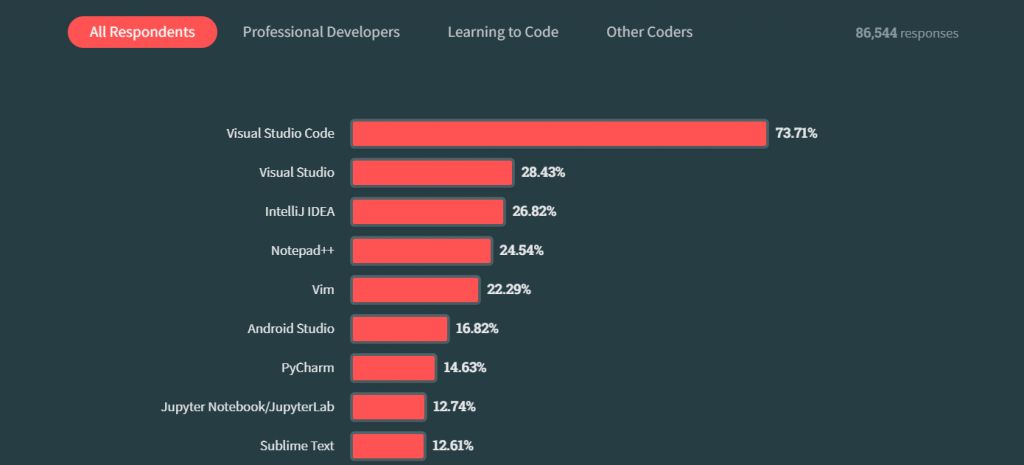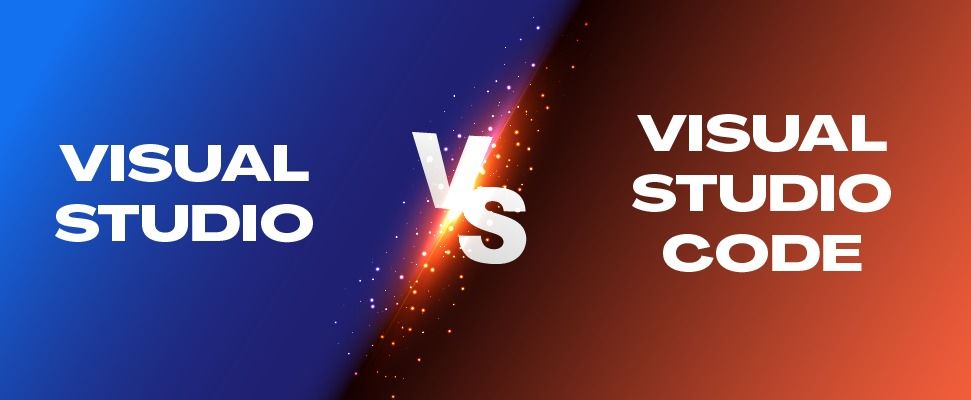Table of Contents
ToggleIntroduction
If you’ve ever dipped your toes into the world of coding, you’ve likely encountered the battle of the century: Visual Studio vs. Visual Studio Code. It’s a bit like comparing Batman and Robin—both are awesome, but they have very different vibes. So, let’s dive into this showdown and see which hero fits your coding style best.
According to Stack Overflow’s 2023 Developer Survey, Visual Studio Code reigns supreme as the most popular development environment, with a whopping 73.71% of developers using it. Meanwhile, Visual Studio also commands respect, with around 28.43% of developers in its camp. So, what gives? Why do some developers flock to VS Code, while others swear by Visual Studio?

Image source: survey.stackoverflow
What is Visual Studio?
Visual Studio is your all-in-one powerhouse for developing complex software applications. It’s perfect for handling large-scale projects and enterprise-level development, offering a robust set of tools for coding, debugging, and deployment.
If you’re working on .NET applications, C++, or need advanced features like integrated testing and collaboration tools, Visual Studio has you covered. Think of it as the go-to platform for building, managing, and scaling big projects with ease.
Example: Imagine you’re part of a team building a high-end video game with stunning graphics, complex mechanics, and extensive multiplayer features. You’re using Visual Studio as your main development hub. It allows you to integrate various components, from the game engine to the networking code, all within a single environment. You can debug the game in real time, manage large codebases with advanced version control, and collaborate with your team using built-in tools. For instance, if your game needs to handle real-time player interactions and save game states securely, Visual Studio’s robust features ensure everything runs smoothly from development to deployment.
What is Visual Studio Code?
Visual Studio Code is your lightweight, go-anywhere editor for everyday coding tasks. It’s ideal for quick edits, scripting, and smaller projects. VS Code shines with its speed and flexibility, letting you customize your environment with extensions and themes to fit your workflow. Whether you’re working on web development, writing scripts, or exploring new programming languages, VS Code is your nimble companion, ready to handle a variety of tasks with minimal overhead.
Example: Now, let’s say you’re working on a small side project—like a personal blog where you’re experimenting with a new JavaScript library. Visual Studio Code is your go-to tool here. It’s lightweight and perfect for quickly writing and testing code snippets, customizing with themes, and using extensions to add functionalities like live previews or linting. You can easily adjust your workspace to fit your preferences, and when you’re ready to try out new features or troubleshoot, VS Code’s fast performance and extensive extension library make it a breeze to iterate and refine your project.
Read More: .NET Core vs .NET Framework
What is the Difference Between Visual Studio and Visual Studio Code?

The key difference between Visual Studio and Visual Studio Code is that Visual Studio is a comprehensive Integrated Development Environment (IDE) designed for full-scale software development, while Visual Studio Code is a lightweight, extension-based code editor.
| Feature | Visual Studio | Visual Studio Code |
|---|---|---|
| Type | Full-fledged IDE | Lightweight Code Editor |
| Languages Supported | .NET, C#, C++, Python, F#, and more | JavaScript, Python, Java, Go, and more |
| Performance | Resource-heavy, best on powerful machines | Lightweight, quick, and efficient |
| Best For | Large-scale projects, enterprise applications | Quick edits, web development, smaller projects |
| Cost | Paid (with free Community edition) | Free |
| Extensions | Limited but deep integration | Over 30,000 extensions |
| Git Integration | Built-in, with rich features | Built-in, with streamlined features |
| Debugger | Advanced, comprehensive | Basic, but extendable |
| Learning Curve | Steep | Easy to get started with |
| Customizability | Less flexible | Highly customizable |
Scope
- Visual Studio: If you’re tackling a massive, enterprise-level project, Visual Studio is your go-to. It’s like the Swiss Army knife of development, loaded with everything you need.
- Visual Studio Code: For day-to-day coding tasks or smaller projects, VS Code is your sleek, portable sidekick. It’s lightweight and versatile, perfect for quick work.
Verdict: Visual Studio for large-scale projects, VS Code for everyday coding.
Features
- Visual Studio: Packed with built-in debugging, testing, and deployment tools, Visual Studio is like having a fully stocked toolbox at your disposal. No need to assemble anything – it’s all there.
- Visual Studio Code: While not as loaded out of the box, VS Code shines with its extensive extension library. Want something specific? Just grab it from the marketplace and customize your setup.
Verdict: Visual Studio for a comprehensive feature set, VS Code for flexibility with extensions.
Languages
- Visual Studio: It’s a powerhouse for .NET, C++, and other robust languages, making it ideal for heavy-duty coding.
- Visual Studio Code: Thanks to its extension-based model, VS Code supports just about any language you throw at it. It’s like the universal remote of coding editors.
Verdict: Visual Studio for specialized, large-scale languages; VS Code for a wide range of language support.
Performance
- Visual Studio: While it’s feature-rich, Visual Studio can be a bit heavy. Think of it as a luxury car – powerful and equipped for anything, but not exactly light.
- Visual Studio Code: VS Code, on the other hand, is quick and nimble. It’s streamlined, making it perfect for smaller projects and fast coding tasks.
Verdict: VS Code for speed and lightweight performance; Visual Studio for handling complex applications.
Integration
- Visual Studio: When it comes to Microsoft services and enterprise tools, Visual Studio is a pro. It integrates seamlessly, like that employee who knows everyone and can get things done effortlessly.
- Visual Studio Code: While VS Code isn’t as deeply integrated out of the box, its customization options are top-notch. You can tweak it to fit your unique workflow, from themes to extensions.
Verdict: Visual Studio for deep Microsoft integration; VS Code for customization and personal flair.
Which Should You Choose Between Visual Studio and Visual Studio Code?
- Choose Visual Studio if:
- You need a powerful IDE for large, complex projects.
- You require built-in tools for debugging, testing, and deployment.
- You’re working primarily with .NET or C++.
- You prefer an integrated, all-in-one development environment.
- Choose Visual Studio Code if:
- You want a lightweight, fast editor for everyday tasks.
- You need flexibility and customization through extensions.
- You’re working on smaller projects, scripts, or web development.
- You value speed and simplicity with the option to tailor your setup.

Don't miss out on your chance to work with the best
Apply for top global job opportunities today!
Final Thoughts
Ultimately, the choice between Visual Studio and Visual Studio Code boils down to your coding style and project needs. Whether you’re constructing intricate skyscrapers of code or just fixing up a cozy little script, both tools have their superpowers.
So, pick the one that suits your workflow, roll up your sleeves, and get coding. Remember, it’s not just about which tool you use—it’s about how you make that code sing!
Take control of your career and land your dream job
Sign up with us now and start applying for the best opportunities!


